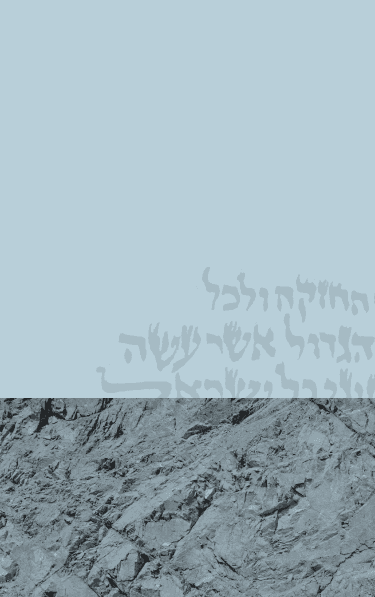

All Portions

TetzavehShemot (exodus)
Bereshit
Bereshit (genesis)
Sure, it begins with the spectacular story of all creation, but Bereshit is first and foremost the story of one family and its covenant with God. Again and again, members of this inimitable family—Abraham, Isaac, Jacob, Sarah, Rebecca, Rachel, Leah—face seemingly insurmountable challenges, and again and again discover the innate potential God always knew they possessed. This is why, millennia later, Bereshit still feels so fresh and so shockingly relevant: It’s a book about becoming, about rising from humble beginnings and out of deep uncertainty into a future humming with life, love, and growth. And with moments like the Binding of Isaac, the Flood, and the Tower of Babel, Bereshit delivers a torrent of morality tales we still study today as we strive to do the right thing.
God creates the world in six days and rests on the seventh, places Adam and Eve in the Garden of Eden, and expels them after they eat from the Tree of Knowledge.
Shemot (exodus)
If Bereshit was the story of a family, Shemot is the story of this family becoming a nation. Ironically, it is the Israelites’ worst enemy, the wicked Pharaoh, who first calls them an am, or a people. This am spends the entirety of Shemot trying to grapple with the consequences of this transformation. Becoming a nation means developing an understanding of their shared destiny and of their common source of renewable spiritual energy, God’s commandments. It also means shedding off the mental yoke imposed by centuries of slavery, and embarking on an exodus not only of body but also of mind. It’s a daunting challenge, which is why the great medieval commentator Rashi explained that only a small portion of the Israelites chose to take the risk and hurry into the wilderness—the rest preferred the familiarity of the house of bondage over the unknown challenges of breaking free. Shemot, then, poses a question we each wrestle with at one point or another in life, namely the meaning of being truly free, and the price we must pay for that privilege.
God explains how the priesthood should function, including initiation, priestly garments, and the everlasting flame of the Menorah.
Vayikra
Vayikra (leviticus)
The best-selling author Herman Wouk once quipped that if the Torah was turned into a movie, Vayikra would remain on the cutting room floor. Take a cursory glimpse, and the sentiment resonates: The book is chock-full of archaic-sounding commandments, many of them pertaining to the priestly class and the work they did way back when in the Mishkan, or God’s temporary dwelling place on earth. What does any of it have to do with modern life? As it turns out, everything. Because Vayikra is a book about purity, holiness, righteousness, and goodness. Once Judaism’s First Family—the one that began with Adam and continued with Abraham, Isaac, and Jacob—learned to understand its covenant with God, and once this family grew to become a nation, it was time to educate this nation about its main goal here on earth, namely living out God’s laws in ways that elevate this imperfect world and fill it with light. As essential as it is sometimes obscure, as poetic as it is often intricate, there’s a reason Vayikra is traditionally the first book offered to small children just starting to read: It’s a book about learning how to grow and stay pure, wisdom we all direly need.
God calls Moses to the Tent of Meeting, where he teaches him the laws of the sacrifices.
Bamidbar
Bamidbar (numbers)
What is Bamidbar about? Its English name, Numbers, sort of tells it all: At its heart, it’s a book of lists. Lists of the Israelite tribes and their princes. List of the gifts each tribe offered the Mishkan, or God’s temporary dwelling place on earth. Lists of the different families that made up the priestly class. Why should we, living millennia after these lists were compiled, care? Because these lists, of course, are not just lists; they’re deep and beautiful guides to life. Pay close attention to their small details, and they’ll tell you stories about humility and righteousness, deliver instructions on how to govern and how to compromise, and sketch out, after Vayikra’s long treaty about holiness, a firm vision of how to go about and set up a concrete society right here on earth. The late, great Rabbi Lord Jonathan Sacks captured the essence of Bamidbar perfectly. “Most religions,” he wrote, “are about accepting the world the way it is. Judaism is a protest against the world that is in the name of the world that ought to be. To be a Jew is to seek to make a difference, to change lives for the better, to heal some of the scars of our fractured world.”
God instructs Moses to conduct a census of all of the military-aged men in the twelve tribes.
Devarim
Devarim (deuteronomy)
Devarim’s English name, Deuteronomy, is Greek for “second speech,” and that’s exactly what it is: As he’s about to pass away, Moses delivers his farewell speech, which repeats most of what was conveyed in the rest of the Torah, from historical accounts to detailed investigations of God’s commandments. But Moses’s repetition is anything but redundant, and it’s focused much more on the future than on the past. The Israelites, the great leader knows, will soon enter the Promised Land, and they will do so without Moses himself, the man who had guided them for decades through their journey in the wilderness. The speech, then, is an epic poem, inspiring the people to understand that though Moses may soon be gone, the Torah he received from God and taught to the people is eternal, and when implemented in practice, in the Promised Land, it will help the Israelites take on the greatest of all known human tasks—Tikkun Olam, or repairing the world, making it holier and more just according to God’s plan.
Thirty-seven days before his death, Moses begins repeating the Torah to the Israelites.